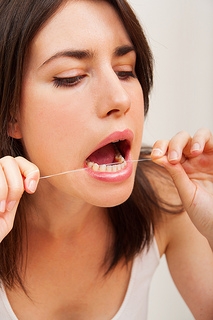August 28th, 2015

Whether it’s a dull and throbbing ache or a sharp pain, toothaches can come in many different forms. Chances are you’ve had the discomforting experience once or twice in your life. It’s the type of experience that nobody wants to have, because a toothache can be as annoying as fingernails scratching a chalkboard.
What’s a good way to describe a toothache? Let’s see … your mouth feels as if it’s being besieged by one of those Loony Tunes-style jackhammers. As fate would have it, toothaches always seem to occur over the weekend or after-office hours, leaving you to suffer and forcing you to cancel your reservation at that high-end restaurant you’ve been anticipating all week.
Not so fast!
While you’re probably going to want to skip the rib-eye steak, there are numerous tried-and-true home remedies you can use to ease the pain until you can make an appointment with our office. Here’s a look at four ways to soothe a toothache.
- Don’t underestimate the power of salt water. Rinsing your mouth with warm salt water will both soothe your toothache and disinfect your mouth. However, make sure the water is warm; cold water can further exacerbate a sensitive tooth. Follow up the saltwater rinse by swishing your mouth with hydrogen peroxide.
- Clove oil, eucalyptus oil, peppermint oil, and vanilla extract are proven to be comforting elixirs. Dip a cotton swab in one of these mixtures and apply it to your tooth and gums. These substances, which you may even have in your kitchen cupboards, are known to have pain-relieving qualities. For the best results, repeat the application throughout the day.
- Eating yogurt is good for toothaches and mouth pain. Yogurt is filled with healthy bacteria that combat pain. Afterward, place a cold compress on your jaw.
- Try flossing. Your toothache might be throbbing and severe, but there’s always a chance the pain is caused by a piece of food awkwardly lodged in your teeth.
We hope that helps! Give Watkins Family Dental Care a call to learn more!
August 21st, 2015

If you or your children suffer from dental anxiety, you aren’t alone. According to the Cleveland Clinic, between nine and 15 percent of Americans admit to feeling sufficiently afraid of going to the dentist to avoid making an appointment. The potential consequences of dental anxiety extend beyond poor oral health. Lack of dental care can cause serious but easily preventable medical conditions.
Dental Anxiety versus Dental Phobia
Dental anxiety provokes a sense of fear in people, typically before they arrive at Watkins Family Dental Care. Those fears or worries are often exaggerated. Dental phobia shares many of the symptoms that characterize dental anxiety. It is a much more serious manifestation of that anxiety, and may provoke a sense of panic or terror in people. While people who suffer from dental phobias know that their feelings are irrational, they are unable to control, stop, or change those thoughts.
People who have dental phobias often avoid going to the dentist, and they come up with every possible excuse to justify not going. The only time a person who suffers from a dental phobia will go to the dentist is when he or she is forced to do so, or because of intense tooth pain. People who have dental anxiety don’t go to such extremes to avoid going to the dentist; anxiety usually begins in anticipation of the appointment.
What We Do to Ease Patient Anxiety
Drs. Thomas and Andrew Watkins and our staff have many techniques we can use to help patients feel more comfortable at their appointments. Dental Fear Central gives some simple suggestions to help children and adults who are apprehensive about going to the dentist, even if they suffer from the more severe form of anxiety: full-blown dental phobia.
- The Tell-Show-Do Approach: We help our patients relax by making sure they understand what is involved in the exam and any procedure they may undergo. We tell patients about the procedure, show them the tools and equipment we intend to use, and answer questions before actually performing the procedure. This is helpful for patients who don’t know what to expect.
- Distraction: We offer personal music players and a collection of CDs that patients can listen to. The relaxing qualities of music may help distract a patient enough to make the process less stressful. In-office televisions allow you to watch TV while waiting for your appointment.
Drs. Thomas and Andrew Watkins and our staff know that some patients are anxious about dental treatment, and we go to great lengths to make you feel more comfortable. Good oral health is very important, and when your mouth isn’t healthy, you can suffer from many other easily preventable medical problems.
August 14th, 2015

The human heart truly appreciates it when we eat healthy foods, don’t smoke, and exercise regularly. But there’s something else that can improve your heart’s longevity and you may not know about: keeping your teeth and gums in tip-top shape.
Bacteria responsible for periodontal disease have been found in the heart area of subjects who suffer from artery inflammation, high cholesterol, and heart disease. Physicians and dentists, like Drs. Thomas and Andrew Watkins, think that it is not difficult for oral bacteria to enter the bloodstream through diseased, bleeding gums, and abscesses that reach from the gums into veins and capillaries that carry blood to and from the heart.
In addition to practicing good oral hygiene and visiting Watkins Family Dental Care every six months, here are ten other ways you can make your heart love you for the rest of your life:
- Avoid eating foods that contain saturated fat (fatty meats, processed meats, pastries, butter).
- Craving a crunchy snack? Grab a handful of tree nuts: pecans, almonds, walnuts. They’re rich in monounsaturated fats (the “good” kind of fat) as well as vitamin E, magnesium, and potassium.
- Eating a bowl of oatmeal for breakfast nourishes your heart with a soluble fiber called beta-glucan that can reduce cholesterol and help prevent atherosclerosis.
- Think “fish” the next time you shop for groceries, especially sardines, salmon, fresh tuna, and mackerel. These fish provide omega-3 fatty acids that lower triglycerides and blood pressure, and may help prevent blood clots from forming.
- Opt for whole grains over processed white breads and cereals.
- Put that remote control (or computer mouse) down right now and get moving! Walk, swim, ride a bike, plant flowers; your heart likes to pump, so make it pump.
- Refresh your brain and improve your heart health with at least eight hours of sleep every night.
- De-stress your life as much as possible: relax, stay optimistic, and don’t sweat the petty stuff!
- Watch your weight and get regular health examinations, especially if you have a family history of heart disease.
- And don’t forget to brush, floss, and rinse twice a day!
August 7th, 2015

Bad breath: We’ve all dealt with it. You’ve been around people who have it and, like it or not, you have had it yourself. It can be embarrassing and uncomfortable, but how do you know if you have it? There is actually a simple test you can do to see if you have bad breath.
Wash your hands well, then put your finger in your mouth, way in the back. Scrape a little saliva from the back of your tongue, and then dab it on the back of your hand. Wait for one minute, then hold your hand to your nose and sniff. Is it fresh as a daisy? Or do you need to keep reading and learn how to freshen your breath?
How Bad Breath Starts
There are several ways that bad breath starts. Knowing the causes of bad breath is a solid start toward the cure.
- The bacteria in your mouth: Bacteria is always in your mouth. It covers your gums, hides between your teeth, and hangs out on your tongue. As it multiplies, it produces toxins that cause the foul odor in your mouth.
- Your bad habits: If you smoke cigarettes, a pipe, or cigars, or chew tobacco, you are not only harming your mouth and body, you are creating some really smelly breath.
- Your tonsils: If you still have your tonsils, they can be the cause of bad breath. They are pitted, so smelly substances can collect in the pits and lead to bad breath.
- Stomach issues: A stomach virus, ulcer, GERD, and other stomach issues could be the cause of your bad breath. A low-carb diet can put your body into a state of ketosis, which causes very bad breath.
- The foods you eat: Garlic, onion, and other pungent foods will linger with you … on your breath.
Tips for Busting Bad Breath
Achieving fresh breath isn’t difficult, but it does require a little work. Try these tips for fresher breath and a healthier mouth.
- Brush your teeth after every meal. You can also pick up a tongue scraper to use a couple of times a day to remove any lingering bacteria on your tongue.
- Floss once a day to remove food particles between your teeth as well as plaque. Your mouth will thank you.
- Gargle with special mouthwash to banish bad breath. The oxygen in it will kill the bacteria in your mouth that is causing your bad breath, and leave you fresh as a daisy!
- Drink water to avoid dry mouth, which is a common cause of bad breath.
- Ease your tummy troubles with antacids and other remedies. Ginger tea is a great tummy tamer.
- Chew gum that contains xylitol. Saliva keeps your mouth moist, and chewing gum makes you salivate. Bye bye, bad breath!
- Eat yogurt. It contains “good” bacteria that helps balance your gut and gives you a healthier mouth.
- Soothe your sinuses. Sinus infections can cause you to have bad breath. Actually, it is the post-nasal drip that causes the foul odor. Cure the infection and your breath will improve.
- Avoid all tobacco products (cigarettes, pipes, cigars, chewing tobacco, and snuff).
- Eat a healthy diet of fresh fruits and vegetables, lean meats, and whole grains.
And don't forget! Get regular dental checkups at Watkins Family Dental Care.





 Website Powered by Sesame 24-7™
Website Powered by Sesame 24-7™